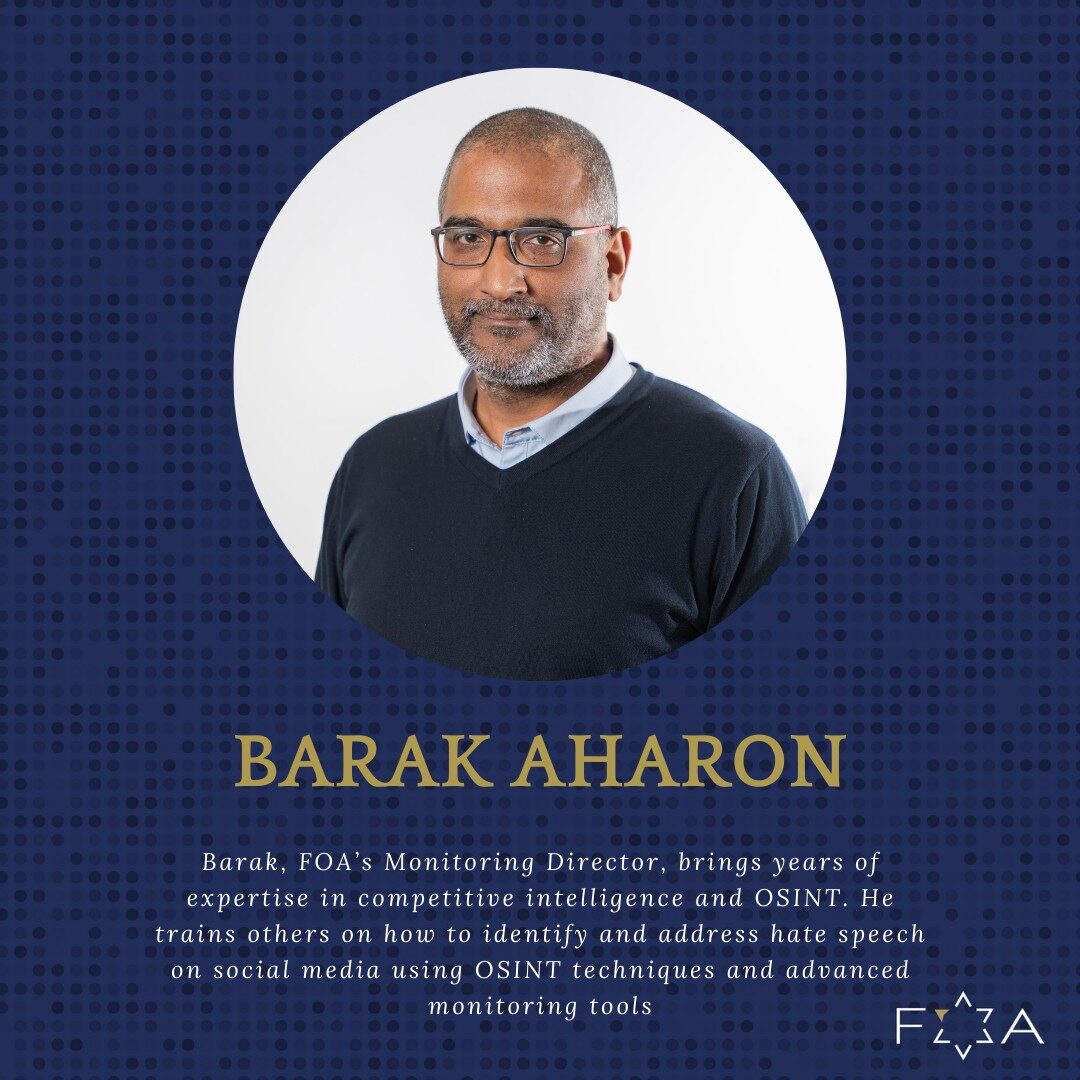Reading Time 7 min. | 882 words
Tell us a little about yourself?
My name is Barak Aharon. Born and raised in Israel. Over the past 15 years, I’ve worked in the roles of sales and business development, mostly in software solutions to big institutes. As part of my work I’ve been involved in business intelligence and market research, tracking competitors and identifying trends. Outside of work, I enjoy carpentry, I even worked as a carpenter for some time and gained experience.
What inspired you to volunteer with FOA?
In 2019 and 2020, I took a few courses in OSINT, which stands for Open Source Intelligence. I found the field really interesting and wanted to explore it further. Then, in August 2020, I came across a post from FOA inviting people to join their monitoring team to help fight online antisemitism. It felt like the perfect opportunity. On one hand, I could contribute to an important cause, and on the other, I could continue building my skills in OSINT. At the same time, I was working quite a bit in Europe and often had conversations with colleagues about the Israeli-Palestinian conflict. I started noticing that many of them had very negative opinions about Israel. Over time, I realized that a big part of this came from what they were seeing online—mostly one-sided content that was not only anti-Israel but often antisemitic. What bothered me most was that even when I tried to explain the situation in a calm, neutral way, people weren’t open to hearing another perspective. That frustration really pushed me to take action and get involved.
How concerned are you about online antisemitism? Did you encounter online antisemitism before or after you started volunteering?
I’m extremely concerned. The amount of hate and violent content I’ve encountered through the monitoring work has been overwhelming. Things have significantly escalated since October 7, 2023, which seemed to act as a catalyst for a surge in antisemitic content. It really opened my eyes to the extent of the problem. I’ve seen posts mocking Israeli hostages, celebrating the death of the Bibas family—it’s deeply disturbing. Before I began volunteering with FOA, I had no idea this level of hate was so widespread on social media.
Can you tell us a bit about your role at FOA?
As the monitoring director I am responsible for leading and supporting the volunteer monitoring team in identifying and reporting antisemitic content on social media. This includes training volunteers, developing instructional materials, and supervising day-to-day monitoring activities to ensure quality and consistency. The role also involves analyzing reported content, preparing regular reports on antisemitic trends, managing the content database, and checking removal rates across platforms. Additionally, the Monitoring Manager collaborates with the tech and social media teams to enhance monitoring tools and share organizational achievements, while also delivering lectures and workshops in Hebrew and English to raise awareness and recruit new volunteers.
What do you enjoy about volunteering with FOA?
I take pride in leading the monitoring team. Working with FOA has allowed me to connect with incredible people from around the world, each bringing their own background and motivation, yet all united by a common goal. It also gives me a strong sense of being at the heart of what’s happening online, staying constantly informed and engaged. One of the most heartwarming parts for me is the non-Jewish members of our monitoring team. They joined because they care about the Jewish people and genuinely support Israel. It’s a powerful reminder that we do have supporters all over the world, even if we don’t always hear them. That, at least, gives me a bit more hope.
Has anything you’ve learned about online antisemitism surprised you?
What surprised me most is just how widespread and extreme online antisemitism really is far beyond what I ever imagined. As someone born and raised in Israel, I never personally encountered antisemitism, so I wasn’t fully aware of its scope. But after being exposed to such a large volume of hateful content over the years, I’ve come to understand how serious the problem is. It’s also clear that the experience is very different for Jews living abroad, many of our monitoring team members who made Aliyah often share how they faced antisemitism directly in their home countries.
What are your hopes for the future in the fight against online antisemitism?
It’s difficult for me to feel optimistic, especially after the events of October 7, the ongoing war, and the constant exposure to hatred and violence through my work at FOA. Still, being part of FOA also means connecting with people who stay hopeful and are genuinely committed to making things better for Jews around the world. I hope to see a stronger, more unified online presence from Israel and Jewish communities, one that actively educates, challenges hate, and corrects misinformation. I truly believe we can build a global network of volunteers that not only responds to antisemitism but helps shape a more accurate and respectful online conversation. And I’d really love to see more non Jews joining and showing their support too, it’s powerful, and it reminds us that we’re not alone in this fight. What I ultimately hope for is that people begin to see the truth, not just the loudest or most hateful voices.

